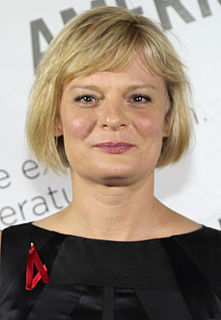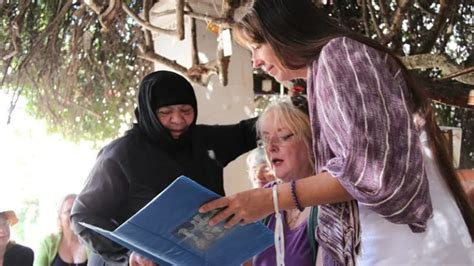A Quote by Celine Sciamma
We are always told that with women's rights and opportunities for women there's been constant progress, and it isn't true. It works in cycles.
Related Quotes
I think in a society where you can't even pass the Equal Rights Amendment, it's very difficult to women make a progress. Incidentally, we are exactly 160 years after the very first women's public rights convention in Seneca Falls, New York, when a handful of women started it all and began the movement to make women equal.
The Grimm brothers always said that their informants were women, which is possibly not true, women of the people. There is the constant evocation of women's voices, in the collecting and arrangement of these stories, and yet the message of so many of them is incredibly misogynist. I was very puzzled by that, and that book explores that contradiction.
In the early fight for women's rights, the point was not that women were morally superior or better. The conversation was about the difference between men and women - power, privilege, voting rights, etc. Unfortunately, it quickly moved to the "women are better" argument. If this were true in life or in fiction, we wouldn't have any dark or deep characters. We wouldn't have any Salomes, Carmens, Ophelias. We wouldn't have any jealousy or passion.
If you just look at the number of roles for women versus the number of roles for men in any given film, there are always far more roles for men. That's always been true. When I went to college, I went to Julliard. At that time - and I don't know if this is still true - they always selected fewer women than men for the program, because there were so few roles for women in plays. That was sort of acknowledgment for me of the fact that writers write more roles for men than they do for women.
Violence against women continues to persist as one of the most heinous, systematic and prevalent human rights abuses in the world. It is a threat to all women, and an obstacle to all our efforts for development, peace, and gender equality in all societies. Violence against women is always a violation of human rights; it is always a crime; and it is always unacceptable. Let us take this issue with the deadly seriousness that it deserves.
The backlash against women's rights would be just one of several powerful forces creating a harsh and painful climate for women at work. Reagonomics, the recession, and the expansion of a minimum-wage service economy also helped, in no small measure, to slow and even undermine women's momentum in the job market. But the backlash did more than impede women's opportunities for employment, promotions, and better pay. Its spokesmen kept the news of many of these setbacks from women. Not only did the backlash do grievous damage to working women C it did on the sly.
Marjan. I have told him tales of good women and bad women, strong women and weak women, shy women and bold women, clever women and stupid women, honest women and women who betray. I'm hoping that, by living inside their skins while he hears their stories, he'll understand over time that women are not all this way or that way. I'm hoping he'll look at women as he does at men-that you must judge each of us on her own merits, and not condemn us or exalt us only because we belong to a particular sex.
I get very frustrated when I hear women saying, "Oh, feminism is passé," because I think feminism means empowerment. Men can be feminists, too! Many men are feminists. We need feminism. It's not against men; it's about the empowerment of women. It's the respect of women - giving women equal rights, the same opportunities.
































